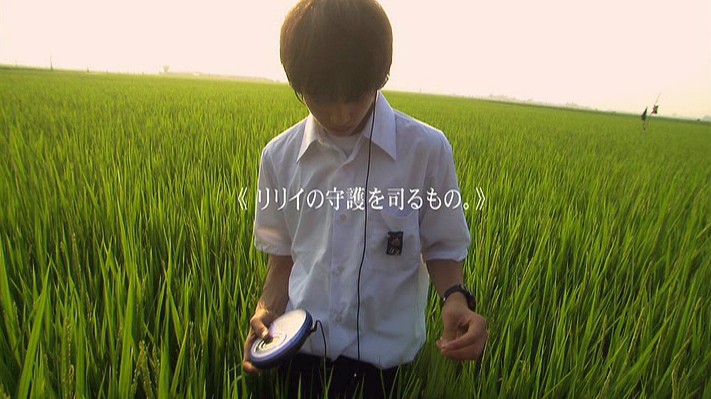Title: Nada Sou Sou aka Tears For You
Genre: Drama/Romance
Director: Nobuhiro Doi
Format: Movie, 118 minutes.
Dates: 30 Sep 2006
Synopsis: 21-year-old Yotaro works odd jobs in mainland Okinawa, earning money to provide for his younger sister Kaoru, who lives in a small village in an outlying island off the coast of Okinawa. When she arrives on the mainland to join him and attend a top high school, Yota works doubly hard to see her through high school and college. As sibling affection grows into something more, and threaten to destroy the comfortable sibling relationship between them, they eventually come to a point where they have to make a decision.
The Highlights
Cinematography: Beautiful and awe-inspiring.
Story: You know what’s coming, but it still impact anyway.
Cast: Superb, subtle acting.
In 2001, Natsukawa Rimi released her third single, titled “Nada Sou Souâ€. It was the song which brought her fame all over Japan, and a Mandarin cover of it was released in Singapore by the singer Joi Chua, titled “Pei Wo Kan Ri Chuâ€. It gained an English cover in 2007, sung by New Zealand ingénue Hayley Westenra, and remains to this day one of Japan’s favourite songs. In 2006, a movie was released revolving around the theme of the song, and the song itself featured in the ending credits of said movie; Nada Sou Sou.
To describe this movie as a story of suppressed feelings between siblings though, is to miss the point entirely; it is, more than anything else, a lesson on life, relationships, and ultimately, family. Nowhere is this more pronounced than when the movie focuses on Yotaro and Kaoru; from the quiet ways in which brother and sister cheer for, get embarrassed by, support, and even quarrel with each other, the movie takes all the elements that come together to form the idea of “familyâ€, and concentrates it into just under two hours to come up with a formula that will, at the very least, warm the hearts of anyone who does not willfully insist on erecting a barrier of cynical prejudice around his or her heart.
What is truly unique about this movie within its genre, is its willingness to deal with real life issues; people will cheat you for their own purposes, a romantic relationship between two people from differing social statuses will not work out due to societal pressures, problems can cause strains in even the closest of bonds, and even the person closest to you will have to leave you eventually; in short, life is hard. It is because of this ability to use real life issues to move the plot along, without the apparent need to introduce plot devices out of nowhere, which particularly makes this movie shine.
It certainly doesn’t hurt that the viewer literally gets to see Kaoru grow up; played by Nagasawa Masami (who first broke onto the scene with her portrayal of the ill-fated Hirose Aki in Crying Out Love, In the Center of the World) Kaoru literally changes throughout the course of the movie. Even though Nagasawa’s initial portrayal of Kaoru as wide-eyed village girl may come across as mind-grating with her saccharine-sweet voice, it is there to contrast with the later portrayals of Kaoru as worried sister, and afterwards as a mature young woman. Tsumabuki Satoshi of Waterboys fame also puts in a stellar performance as Yota, portraying with great skill the portrait of a young man struggling to provide for his younger sister, shouldering all the burden while he smiles for Kaoru and tries to keep her shielded from the very real problems of their financial situation.
Last but not least, director Nobuhiro Doi brings the quietly beautiful cinematography ofIma, Ai ni Yukimasu to this movie with great effect; the homely beauty of Okinawa is done justice under his hands, and the warmth of its inhabitants is portrayed to full effects by the supporting cast. The shots of the sea are especially beautiful, and the activity of Okinawan life is balanced with the darkness and quiet of privacy. Such a style of cinematography complements the story well; it is, after all, what Japanese films of this genre tend to be particularly good at.
Nada Sou Sou is, at its heart, a story about family, about growing up. Watch it with the person you treasure the most in your life; the experience will be even better that way.
Article Source : http://www.nihonreview.com/live-action/nada-sou-sou/
My Opinion : Ceritanya sangat menyentuh, Tentang pengorbanan seorang kakak untuk adiknya agar bisa terus menempuh sekolahnya. Lambat laun benih-benih cinta tumbuh pada diri sang adik. Film ini mempunyai jalan cerita yang bagus, penuh pesan moral, dan yang pasti menguras air mata ! Buktikan sendiri kalau anda tak percaya.







